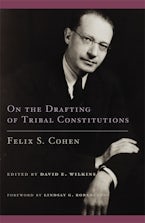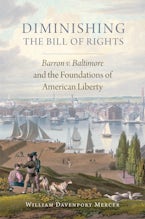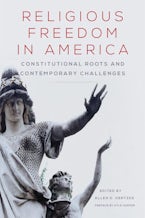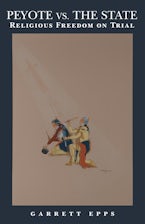LAW / Constitutional
Showing results 1-6 of 6
Filter Results OPEN +

Loren Miller
Civil Rights Attorney and Journalist
Loren Miller: Civil Rights Attorney and Journalist recovers this remarkable figure from the shadows of history and for the first time fully reveals his life for what it was: an extraordinary American story and a critical chapter in the annals of racial justice.
Greece, Rome, and the Bill of Rights
Susan Ford Wiltshire traces the evolution of the doctrine of individual rights from antiquity through the eighteenth century. The common thread through that long story is the theory of natural law.
On the Drafting of Tribal Constitutions
Felix Cohen (1907–1953) was a leading architect of the Indian New Deal and steadfast champion of American Indian rights. Appointed to the Department of the Interior in 1933, he helped draft the Indian Reorganization Act (1934) and chaired a committee charged with assisting tribes in organizing their governments. His “Basic Memorandum on Drafting of Tribal Constitutions,” submitted in November 1934, provided practical guidelines for that effort.
Diminishing the Bill of Rights
Barron v. Baltimore and the Foundations of American Liberty
In explaining how the Court came to reject a multisourced view of human liberties—a position seemingly inconsistent with its previous decisions—William Davenport Mercer helps explain why we now envision the Constitution as essential to guaranteeing our rights.
Religious Freedom in America
Constitutional Roots and Contemporary Challenges
This truly interdisciplinary volume brings together respected historians, social scientists, legal scholars, and advocates. As their contributions attest, understanding religious freedom demands taking multiple perspectives. The historians guide us through the contested legacy of religious freedom, from the nation’s founding and the rise of public education, to the subsequent waves of immigration that added successive layers of diversity to American society.
Peyote vs. the State
Religious Freedom on Trial
With the grace of a novel, this book chronicles the six-year duel between two remarkable men with different visions of religious freedom in America. Neither sought the conflict. Al Smith, a substance-abuse counselor to Native Americans, wanted only to earn a living. Dave Frohnmayer, the attorney general of Oregon, was planning his gubernatorial campaign and seeking care for his desperately ill daughters. But before this constitutional confrontation was over, Frohnmayer and Smith twice asked the U.S. Supreme Court to decide whether the First Amendment protects the right of American Indians to seek and worship God through the use of peyote. The Court finally said no.

Loren Miller
Civil Rights Attorney and Journalist
Loren Miller: Civil Rights Attorney and Journalist recovers this remarkable figure from the shadows of history and for the first time fully reveals his life for what it was: an extraordinary American story and a critical chapter in the annals of racial justice.
Greece, Rome, and the Bill of Rights
Susan Ford Wiltshire traces the evolution of the doctrine of individual rights from antiquity through the eighteenth century. The common thread through that long story is the theory of natural law.
On the Drafting of Tribal Constitutions
Felix Cohen (1907–1953) was a leading architect of the Indian New Deal and steadfast champion of American Indian rights. Appointed to the Department of the Interior in 1933, he helped draft the Indian Reorganization Act (1934) and chaired a committee charged with assisting tribes in organizing their governments. His “Basic Memorandum on Drafting of Tribal Constitutions,” submitted in November 1934, provided practical guidelines for that effort.
Diminishing the Bill of Rights
Barron v. Baltimore and the Foundations of American Liberty
In explaining how the Court came to reject a multisourced view of human liberties—a position seemingly inconsistent with its previous decisions—William Davenport Mercer helps explain why we now envision the Constitution as essential to guaranteeing our rights.
Religious Freedom in America
Constitutional Roots and Contemporary Challenges
This truly interdisciplinary volume brings together respected historians, social scientists, legal scholars, and advocates. As their contributions attest, understanding religious freedom demands taking multiple perspectives. The historians guide us through the contested legacy of religious freedom, from the nation’s founding and the rise of public education, to the subsequent waves of immigration that added successive layers of diversity to American society.
Peyote vs. the State
Religious Freedom on Trial
With the grace of a novel, this book chronicles the six-year duel between two remarkable men with different visions of religious freedom in America. Neither sought the conflict. Al Smith, a substance-abuse counselor to Native Americans, wanted only to earn a living. Dave Frohnmayer, the attorney general of Oregon, was planning his gubernatorial campaign and seeking care for his desperately ill daughters. But before this constitutional confrontation was over, Frohnmayer and Smith twice asked the U.S. Supreme Court to decide whether the First Amendment protects the right of American Indians to seek and worship God through the use of peyote. The Court finally said no.







